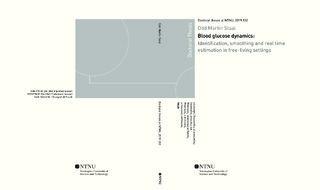Blood glucose dynamics: Identification, smoothing and real time estimation in free-living settings
Doctoral thesis
Permanent lenke
http://hdl.handle.net/11250/2609090Utgivelsesdato
2019Metadata
Vis full innførselSamlinger
Sammendrag
Diabetes currently affects about 9% of the world’s population, and causes loss or impairment of the body’s ability to control blood glucose (BG). Frequent BG measurements and medications, including insulin injections, are needed to keep BG as close as possible to the normal range.
Dynamic models that describe BG originated in clinical research settings and have helped towards understanding the physiology of diabetes and developing external systems that control BG. Glucose dynamics is highly person-dependent, so individualisation of the BG dynamics model to patient data is desirable. Many diabetes patients are currently using Continuous Glucose Monitors and insulin pumps, gathering large amounts of data from free-living settings, which can potentially be used to individualise models. One challenge with this approach is that the only available measurement from the internal state of the body in these data is the glucose concentration, whereas many models require more measurements, e.g. of plasma insulin, to avoid observability and identifiability problems. Another challenge is that the quality of the data from free-living settings is frequently poor, with missing data and other errors occurring both in the glucose data and in the logged meal data.
The aim of this PhD project has been to use BG dynamics models for real-time estimation and prediction based on continuous glucose data, using individualized models of BG dynamics, and achieving the individualisation based on data from freeliving settings. Publications from the PhD project relate to glucose data cleaning, glucose sensor characterisation, identifiability analysis in blood glucose dynamics models, and meal detection in glucose data, and are included as appendices to the thesis. The main text of the thesis contributes a review of physiology of blood glucose dynamics, diabetes, diabetes related technology, blood glucose modelling and identification of dynamic models. The PhD work contributes to Prediktor Medical’s development related to products for blood glucose measurement and prediction.
Består av
Paper A1: Staal, Odd Martin; Sælid, Steinar; Fougner, Anders Lyngvi; Stavdahl, Øyvind. Kalman smoothing for objective and automatic preprocessing of glucose data. IEEE journal of biomedical and health informatics 2018 ;Volum 23.(1) s. 218-226 2168-2194 © 2018 IEEE. Personal use is permitted, but republication/redistribution requires IEEE permission. See http://www.ieee.org/publications standards/publications/rights/index.html for more information.Paper A2: Staal, Odd Martin; Hansen, Heidi Marie Umbach; Christiansen, Sverre; Fougner, Anders Lyngvi; Carlsen, Sven Magnus; Stavdahl, Øyvind. Differences between flash glucose monitor and fingerprick measurements. Biosensors 2018 ;Volum 8:93.(4) s. 1-17 https://doi.org/10.3390/bios8040093
Paper B1: Staal, Odd Martin; Fougner, Anders Lyngvi; Sælid, Steinar; Stavdahl, Øyvind. Glucose-insulin metabolism model reduction and parameter selection using sensitivity analysis. American Control Conference (ACC) 2019
Paper B2: Staal, Odd Martin; Sælid, Steinar; Fougner, Anders; Stavdahl, Øyvind. Meal input estimation from Continuous Glucose Monitor data using Kalman filtering and hypothesis testing
